I don’t want Tony Soprano to die tomorrow night, and something is telling me he won’t. Tomorow night’s finale won’t end “happily,” but I don’t see a bullet or two putting a cap on seven years of great drama. That would be too easy, too pat. A major letdown, in fact.
Sopranos creator David Chase has done too good a job of making James Gandolfini‘s New Jersey gangster not just human and occasionally vulnerable, but us. No matter what Chase may say to interviewers, he’s on Tony’s team through and through. One reason he writes Tony Soprano so well is because he’s essentially writing about his own dark places, and I don’t think Chase hates himself sufficiently to want to kill his own. If he does, I will feel saddened, let down…almost betrayed.
Here’s a final-episode prediction poll piece by various Salon writers.
wired
Salon piece on Paris Hilton
“Let’s just pray that those bad prison sheets scratch her tender white ass enough to get her out of our faces for good. Because we certainly didn’t ask for this, either. No matter how the talking heads and pundits have tried to convince us that Paris is a reflection of our shallowness and stupidity as a culture, most of us have never wanted her to be a symbol of anything. Is the crotch flash an act of subversion, in which Hilton channels the paparazzi to put her image on every cover, from tabloids to respected newspapers alike? Is Hilton, like her understudies Lindsay Lohan and Britney Spears, just a frightened child, overwhelmed and intoxicated by all of the attention the media gives her?” — from Heather Havrilesky and Rebecca Traister‘s Salon piece on the adventures of Paris Hilton.
Cinevegas stuff
I flew to Las Vegas late yesterday afternoon to sample the 2007 Cinevegas Film Festival — just a weekend’s worth this time, I’m afraid. It’s a little after 9 a.m. now. I went downstairs for breakfast around 6:30 a.m. and there were a fair number of party vampires — raggedy guys in their 30s and 40s, groups of young girls in short hottie dresses — who hadn’t yet gone to sleep.
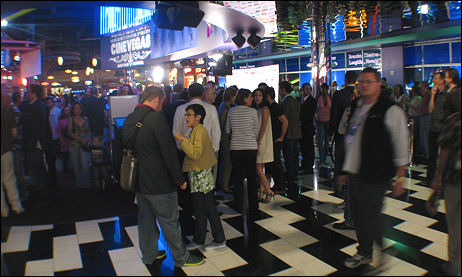
BWR/Cinevegas publicist Chris Libby (bag slung over shoulder) in lobby of Brenden Theatres’ Palm Casino plex — Friday, 6.8.07, 7:50 pm.
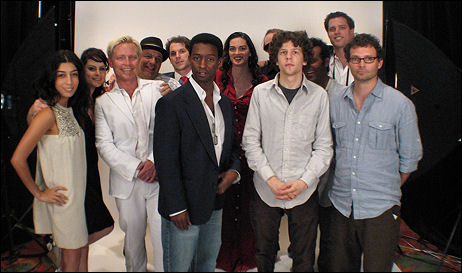
Cast and crew of The Living Wake (star Jessie Eisenberg is the only one I know — I’ll get the names straight later on — publicist Mickey Cottrell is at far right in larger version of photo) — Friday, 6.8.07, 8:05 pm
Vegas is a great place to visit for the first 24 hours, and an awesome place to be when you’ve only been here a few. You can feel the time-to-get-wild attitude when you first walk into your hotel. The problem is how the this environment makes you feel on the second, third and fourth days, etc. I’m not going to rant about this. I just prefer trudging around the Valley of Fire (about 20 miles north of town) to playing blackjack and eyeballing the waitresses.
I tried to see the second half of Simon Bross‘s Bad Habits (Malos Habitos), but festival volunteers blocked me at the entry point. They’d been told to let press people into films only from the very beginning; the guy I spoke to actually told me to “get in line” for the next show. So I asked BWR publicist Chris Libby to facilitate, and I’m told today will be different.
I got into the 8:30 pm screening of Sol Tryon‘s The Living Wake, which the press notes say is “an intelligent, beautifully acted and gloriously funny independent comedy.” It’s about a self-proclaimed artist and genius (Mike O’Connell) who wants to kill himself, and has asked his best friend (Jesse Eisenberg) to chronicle his final hours, including a final life-celebration party — i.e., a “living wake.”
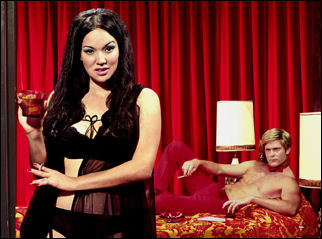
Viva‘s Anna Biller
I could hear people laughing as it played, and I know several songs were sung. But I just got back from Europe two days ago, and the urge to crash around dinner hour is overwhelming. You feel like barbells are pulling your eyelids down. I drank a double espresso and a Red Bull before the film started, but I was gone five minutes after the lights went down. The Living Wake is playing again on Sunday at 1:30 pm, at which point I’ll try again.
I managed to avoid the get-in-line guy and stumbled into Anna Biller‘s Viva around 10 pm. It’s a wink-wink soft-core sex movie mixed in with an early ’70s design movie (clothes, home interiors, etc.) that apes the overlit photography and bad acting of sexploitation films of the ’70s. Nothing like Radley Metzger‘s — more like Russ Meyer‘s without the class.
It’s pretty good in this sense, but after a while bad acting is bad acting, and Biller — who stars as well as directs — reads her lines with the exact same inflections and expressions (Betty Boop voice, come-hither look, arched eyebrows) over and over and over. The film is almost doing the same genre-tribute routine that Grindhouse did, but its low-grade aspects are a little too convincing.
Psychedelic Legacy
There are several sharp, true-blue observations in Jody Rosen‘s Slate piece about the 40th anniversary of the Beatles’ Sgt. Pepper’s Lonely Hearts Club Band, which was released in England on June 1, 1967 but hit U.S. stores on Wednesday, June 3, 1967. The article is mainly about the album’s musical grooves and innovations, but it also acknowledges the social rumblings and currents of that time, and on this level it’s almost staggering to realize that Rosen totally ignores a seismic impact upon the culture at large that this historic album, almost all by itself, brought about.
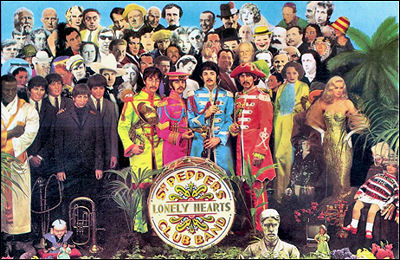
Astonishingly and rather suddenly, beginning in June 1967 and continuing long after that, Sgt. Pepper’s Lonely Hearts Club Band seduced a significant portion of America’s middle-class youths into trying the psychedelic drug adventure, which in turn led to a mass injection of satori/God-head consciousness that literally upended liberal American society.
And it was all primarily the doing of LSD — a substance that created such a profound re-ordering and a scrambling of established grooves in one’s thought processes that it allowed for the mystical to slip through and become real — along with the somewhat milder mescaline and peyote. Tens of thousands of American kids wouldn’t have tried these drugs if the Beatles hadn’t conveyed through the easily decipherable symbology of Sgt. Pepper that spiritual seeking and possible transformation through psychedelia was the Great Youth Adventure of the moment — an adventure, a quest and a challenge that only the dumbest or most regressive or most chicken-hearted twentysomethings of that time ignored or hid from.
In short, by triggering a dam burst of pot and psychedelic drug experimentation among under-25 youths, Sgt. Pepper’s Lonely Hearts Club Band led tens of thousands of American kids into the realms of spiritual satori that Herman Hesse and Aldous Huxley had written about. Suddenly a radiant new world of Eastern mystical transcendence and transformation became a tangible thing among the educated free spirits, hippies and pseudo-hippies of that era. This found its ultimate social fruit in the middle-class spiritual movement of the late ’60s and early ’70s that Tom Wolfe later described as “the Third Great Awakening.”
“Very few people went into the hippie life with religious intentions, but many came out of it absolutely righteous,” Wolfe wrote. “The sheer power of the drug LSD is not to be underestimated.”
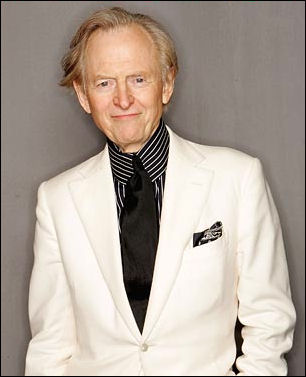
And there has never been a greater piece of LSD recruitment art in world history than Sgt. Pepper’s Lonely Hearts Club Band. I won’t go into the particulars of how the album’s lyrics and general transformative spirit inspired milions of kids to follow the Beatles on their spiritual path. Rosen’s piece alludes to it here and there; the “drugs” chapter on Wikipedia’s Sgt. Pepper page spells it out pretty clearly.
Before Sgt. Pepper, only rock musicians and various other elites in cities and upscale universities were taking LSD and reading dog-eared paperback copies of the Bhagavad Gita. After Sgt. Pepper, the enlightenment-through-LSD ball game became a mass middle-class thing, thus triggering the above-described spiritual revolution.
The downside is that the mass middle-class element diluted the pseudo-cloistered spiritual purity and coolness of then then-nascent hippie movement. This led to a kind of downmarket mongrelization effect — middle-class dropout runaways looking for spare change in the East Village and Haight-Ashbury, using odious, amphetamine-spiked psychedelic drugs sold by scumbags. This gradually resulted in a degenerative hip-fringe meltdown and that famous September 1967 Haight Ashbury parade proclaiming the “death of Hippie.”
Peter Fonda‘s Terry Valentine character says it concisely in Steven Soderbergh‘s The Limey. The legendary “’60s” boiled down an eighteen-month period, he says — “It was ’66 and half of ’67….that’s all it was.”
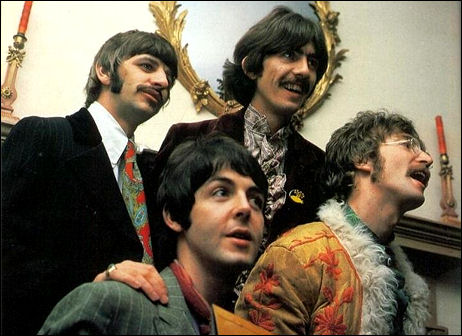
Rosen, yes, is mainly writing about the music of Sgt. Pepper, but the fact that she doesn’t even mention what this album engendered in American society, not even anecdotally, is one of the most bizarre examples of what editorial p.c. thinking brings about when the whip has been cracked once too often. Rosen’s piece is like someone writing about J.M. Flagg‘s famous “I Want You”/Uncle Sam recruiting poster of 1917, and not mentioning a little thing that was going on at the time called World War I.
Here’s Rosen’s sum-up paragraph about Sgt. Pepper‘s impact:
“If Sgt. Pepper’s Lonely Hearts Club Band doesn’t have a concept, it does have a theme. It’s a record about England in the midst of whirling change, a humorous, sympathetic chronicle of an old culture convulsed by the shock of the new — by new music and new mores, by rising hemlines and lengthening hair and crumbling caste systems. In short, it’s a record about the transformations that the Beatles themselves, more than anyone else, were galvanizing.” Rising hemlines!
If there are any under-25s out there haven’t read Wolfe’s “The Me Decade and the Third Great Awakening,” please, please read it now. It’s one of the most brilliant and incisive piece of 20th Century social analysis ever written. And one of the funniest.
The Baca-Hilton connection
Radar’s Jeff Bercovici and Daniel Riley are reporting a friendly-money connection between Sheriff Lee Baca, the Los Angeles law-enforcement glad-hander who ordered Paris Hilton released from jail after serving only three days in her 45-day sentence, and her grandfather William Barron Hilton, who last year contributed $1,000 to Baca’s election campaign.
A grand is the maximum amount allowable under California campaign rules. Baca became a worldwide laughing stock yesterday for deciding to let Hilton serve out the remainder of her sentence under house arrest, in apparent defiance of the orders given by the judge who sentenced her last month. Baca was quoted as saying that he let Hilton go home with an ankle bracelet because she was suffering from a “medical condition,” an explanation that resulted in universal scoffing.
“Sopranos” on Sunday
Tony Soprano’s “pompadoured henchman, Silvio Dante, is barely breathing and full of holes,” begins a story by Reuters’ Arthur Spiegelman and Rick Gorman…obviously assholes who have no regard for the hundreds of thousands Sopranos fans who want to keep themselves clueless about last Sunday’s episode!
Get some guys together, hunt down Spiegelman and Gorman, take ’em out behind the Reuters building and make ’em feel it…right, HE readers?
“His brother-in-law Bobby is dead and Soprano himself is left in a darkened bedroom, clutching a machine-gun like a frightened child holding a teddy bear,” they’ve written.
“He is so abandoned that even his long-conflicted therapist has dropped him as a patient after being convinced by colleagues that “the talking cure” doesn’t work on sociopaths.
“In case you haven’t figured it out, the end is near — on Sunday, to be exact — for one of television’s most riveting programs and maybe for its chief character, North Jersey mob boss and all around family man, Tony Soprano .”
Paris back to jail!
People are whooping and cheering on my street in West Hollywood. Strangers are bear-hugging each other. Well, not really…but it’s lots of fun to imagine this because this is truly a day to kiss the sky. Paris Hilton — God bless those courageous L.A. city attorneys! — has been sent back to jail in Lynwood to serve out her 23 (or is it 45?) days minus five, even though she’s done only three. Ding-dong, the empty dumb bitch is back in the slammer!

TMZ reports that Hilton left the courtroom in tears, screaming, “Mom, Mom…Mom!” Good! Hilton was also heard saying “It’s not right.” No, no, it’s very right — the rightest thing to happen in this country in a long, long time. A witness said that Paris was “physically escorted” out of the courtroom by a female deputy, and that her mother was later seen pacing the hallways and telling reporters, “I’m paralyzed right now.” Good! In fact, have a stroke!
Los Angeles City Attorney Rocky Delgadillo issued this statement to TMZ in response to Judge Sauer’s decision ordering Hilton back to jail: “This decision sends the message that no individual — no matter how wealthy or powerful — is above the law. Today, justice was served.” If the Wizard of Oz Munchkins were to sing a song to Delgadillo about this, one of the lines would go, “We thank you very sweetly for doing it so neatly.”
Storaro says no to digital…for now
Apocalypse Now cinematographer Vittorio Storaro is no friend of shooting movies on digital — or not now, at least. He explains precisely why to Jamie Stuart in this Filmmaker magazine piece. His Univisium system, which uses a 2 to 1 aspect ratio, has “three-perforations per frame and uses the maximum negative space available,” he says. This means the density and fullness you get with film is still way, way richer, he says, than you do with any high-def digital video system.
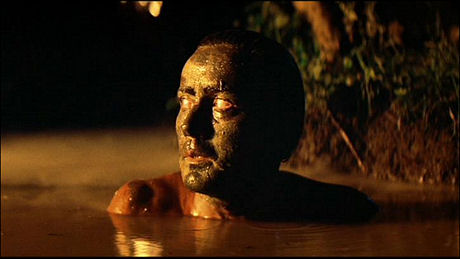
” We’re talking minimum 6000 x 3000 information, or eighteen-million,” he explains. “With a video camera, any subject, the maximum information is roughly 2000 x 1000, which makes two-million. Whatever you’ve got in front of the camera, in one, you’ve got eighteen-million; in one, you’ve got two-million. In one, you’ve got at least 32-bits; the other one, normally you record at 10-bits.
“Film has already proven it can last a hundred years. The electronic system, or digital, has to improve its longevity — particularly, it has a very short longevity. The systems are changing very fast, the material is not very strong. People are very ignorant in this area — they still believe that digital is permanent. That’s a major mistake. Major. So, in my opinion, the system should be used, because if you don’t use the system the company doesn’t have the chance to improve it. It should be improved till it reaches a much better level.
“But at the same time, I think we should be aware of the different levels, so you can use one or the other according to the kind of project that you’re doing.”
“Jesse James” foot-dragging?
How supportive and enthusiastic are Warner Bros. publicists on behalf of The Assassination of Jesse James by the Coward Robert Ford, which comes out on 9.21, or right after the Toronto Film Festival? I won’t name names or publications, but a definite foot-dragging attitude has been detected by reasonable moderate men as far as long-lead requests for various forms of assistance in slapping together Jesse James coverage.
It’s no secret that Warner Bros. execs have been less than fully ecstatic with Andrew Dominik‘s western, which producer Tony Scott has described as a Terrence Malick-type feature. The rumble all along is that WB toppers and marketers consider the film some kind of loss leader (i.e., more or less doomed with the people who loved Spider-Man 3 and Pirates of the Caribbean, and who just can’t wait for Evan Almighty). People like me, of course, can’t wait to see it and are inclined on general principle to support it, unless it turns out to be indulgent garbage.
I’m not saying that this or that WB publicist is, in fact, slacking off on Jesse James, but that studio’s upper-level marketers have long had reputations of being chillty or clueless when it comes to movies of a layered artistic bent. Remember the stories about them scratching their heads and throwing up their hands when they first saw Letters From Iwo Jima? Their decision to keep The Departed out of the Toronto Film Festival (i.e., I never believed producer Graham King‘s story about the film not being ready in time for that festival)?
How come the Assassination of Jesse James website is exactly the same now, content-wise, as it was six months ago? The film opens in three and a half months. Shouldn’t the people running this site be turning the heat up right about now?
Hilton may go back to jail?
The bad guy who let Paris Hilton out of jail — the idiot who determined after hearing about her alleged suicide threat that “there’s a medical issue and it isn’t wise to keep a person in jail with her problem over an extended period of time and let the problem get worse” — is L.A. County Sheriff Lee Baca. Hilton went back to court this morning and may wind up back in the slammer if Judge Michael T. Sauer sees merit in L.A. city attorneys’ challenge to Baca’s decision to release her. The God of Righteousness is a cheap myth, but I want to believe him Him/Her once again because I want Hilton back behind bars before the day is out.
Hilary is doomed
What is it about the fact that “the hinterland Bubbas despise Hilary Clinton, and because of this she will lose the ’08 general election” don’t Hollywood Democrats understand?
Friday choices
It’s Friday, June 8th, and you’re wondering what, if anything, should you see? That’s easy — go rent Ulu Grosbard‘s Straight Time or Sidney Lumet‘s Prince of The City or Shohei Imamura‘s Vengeance Is Mine. The lower-animal-impulse choice in theatres, obviously, is Hostel: Part II. The knockout performance experience (i.e., Marion Cotillard‘s) can be found in La Vie en Rose — it can almost be guaranteed Cotillard will be a Best Actress Oscar nominee. The Big-Ass Blandathon (and I never thought I’d ever be calling it this) is Ocean’s Thirteen.
